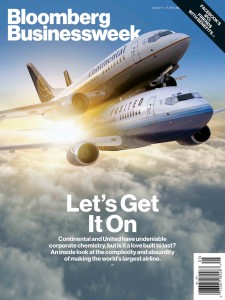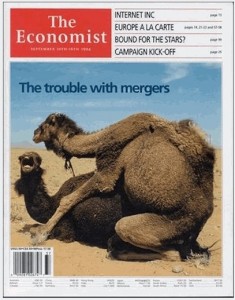As far back as the 1830s, it was clear that an outsider could look at America in a fresh, independent and novel way. Back then, the keen observer of American culture was Alexis de Tocqueville, a French political scientist, historian and politician whose four-volume “Democracy in America” praised much about the burgeoning country, but also noted its flaws.
Tocqueville pointed to equality as the great idea of his era, and he thought that the United States offered the most advanced example of equality in action, as the History website summarized his work. “He admired American individualism but warned that a society of individuals can easily become atomized and paradoxically uniform when ‘every citizen, being assimilated to all the rest, is lost in the crowd.’” Trenchantly, Tocqueville also took note of the irony of the freedom-loving nation’s mistreatment of Native Americans and its embrace of slavery.
Now comes Helen Lewis, a British staff writer for The Atlantic and former deputy editor of England’s New Statesman magazine. She reports on the abundant irony, as well, in just one state, Florida. While exploring various aspects of the state’s odd culture, she casts that irony in timely political terms in a piece headlined “How did America’s Weirdest, Most Freedom-Obsessed State Fall for an Authoritarian Governor?: A journey through Ron DeSantis’s magic kingdom.”
To Lewis, Florida is “America’s pulsing id, a vision of life without the necessary restriction of shame. Chroniclers talk about its seasonless strangeness; the public meltdowns of its oddest residents; how retired CIA operatives, Mafia informants, and Jair Bolsonaro can be reborn there.” To her, the state is “the Australia of America: The wildlife is trying to kill you, the weather is trying to kill you, and the people retain a pioneer spirit, even when their roughest expedition is to the 18th hole.”
And she notes that it’s no surprise that the two top contenders for the GOP presidential nomination, Gov. DeSantis and former President Trump, both call the state home. They fit in smoothly in a place that she says “has come to embody an emotional new strain of conservatism.” She quotes Miami-based author Michael Grunwald saying: “The general Republican mindset now is about grievances against condescending elites, and it fits with the sense that ‘we’re Florida Man; everyone makes fun of us.’ ” Lewis adds that criticism doesn’t faze Florida men, but just emboldens them.
Lewis’s observations struck me as spot on because I’ve recently spent time in two corners of the place, Sarasota and Orlando. In the former, I visited relatives of my wife who live in a gated community that is a haven for retirees – one of many such guarded places in the state. It boasts palm trees, lovely ponds sometimes frequented by alligators, a couple pools and lots of paddle ball-playing oldsters who like the mix of independence and security, as well as the chances to hang out with mostly white middle class folks that such a homogenous place can offer. As for Orlando, I spent several days with grandkids at the Walt Disney World Resort, a place Lewis says “flatters its customers the way Florida flatters the rich, by hiding the machinery needed to support decadence. You absolutely never see Cinderella smoking a joint behind her castle, or Mickey Mouse losing it with a group of irritating 9-year-olds.”
Disney World, Lewis writes, “only underlines how the state is one giant theme park. She quotes Grunwald saying: “This is not a place that makes anything, and it’s not really a place that does anything, other than bring in more people.” She adds, “Having brought in those people, what Florida never tells them is no, nor does the state ask them to play nicely with the other children.” She quotes Grunwald again: “We’re not going to make you wear a mask or take a vaccine or pay your taxes or care about the schools.” (Indeed, I came down with COVID-19 in Florida and had a devil of a time persuading a doctor to give me the new drug Paxlovid. Masks were rare.)
Lewis points out various contradictions about Floridians, noting how they value freedom but call for government help when reality intrudes. “In Florida, no one wants to hear about the costs or the consequences,” she writes. “Why else would people keep rebuilding fragile beachfront homes in a hurricane zone—and expect the government to offer them insurance?”
The central irony in Lewis’s work is that this state so eagerly embraces two GOP politicians who would do more to take power and rights away from individuals – or businesses — than any Democrat would dare to. Both Trump and DeSantis would much like to restrict voting and would curb abortion rights, for instance. Both slam “woke” culture, attacking diversity efforts in academia and business. Indeed, DeSantis recently one-upped Trump by stripping away the independence of state-funded New College of Florida, in Sarasota, as he installed cronies and right wingers such as Christopher Rufo (an out-of-stater famous for attacking critical race theory) on its board.
More than anything, though, DeSantis’s headline grabbing action at Disney World has defined him for a national audience. The governor drove legislation that ended the autonomy that Disney has long exercised over its 39-square mile tract of land near Orlando. He took control of the Reedy Creek Improvement District, which governs the theme parks, hotels and other amenities in the area, appointing a board to oversee municipal services. He did this to punish the Disney Co. CEO at the time for criticizing the “Don’t Say Gay” law of March 2022 that limited what public school teachers could teach.
As the Orlando Sentinel recently editorialized: “…the governor’s ego had been bruised, by tepid criticism from Disney’s then-CEO Bob Chapek, aimed at DeSantis’ hateful attacks on LGBTQ+ people. And though DeSantis loves to chant ‘freedom,’ he’s clearly established that freedom only covers himself and those who follow the same track. For everyone else, retribution is as swift as a whip crack.”
And, as Atlantic writer Lewis put it: “DeSantis is a politician who preaches freedom while suspending elected officials who offend him, banning classroom discussions he doesn’t like, carrying out hostile takeovers of state universities, and obstructing the release of public records whenever he can.”
As I wandered about the Disney resort parks along with thousands of others in this spring-break month, I was struck by how un-Republican DeSantis is. Disney brings in millions of visitors, employs 77,000 “cast members” in its parks, and is responsible for countless other jobs in and around Orlando. It is an economic machine without parallel. So why would any politician, much less a Republican, want to tamper with that?
Beating up on gay and transgender people and on the “woke” culture that encourages toleration seems to be a common trope for right wing politicians these days, though. DeSantis seems to be calculating that railing against Disney and other “woke” companies, as well as political stunts such as busing migrants to more liberal states will garner attention for him in the culture wars. Economics and old-fashioned GOP ideology be damned; it’s all about winning the votes of conservative straight white people who feel threatened by folks of different sexual orientations (and by diversity in all senses).
Firing back at DeSantis, Disney announced that in September it will host a conference promoting lesbian, gay, bisexual and transgender rights in the workplace. Run by the Out & Equal organization, the event is expected to draw some 5,000 people, according to the Miami Herald. The paper reported that the meeting will include dozens of corporate sponsors such as Apple, McDonald’s, Uber, Walmart, Hilton, Amazon, Boeing, Cracker Barrel and John Deere, and several government agencies, including the State Department and the CIA, which will have booths at the conference.
Disney World has committed to host a second annual meeting of the group in 2024, possibly just as DeSantis makes his bid for the White House. Slamming Disney yet again at that point could play well for him with the culturally conservative folks he needs to steal away from Trump. And, certainly, his attacks would grab more headlines. But will that tune play well for most American voters, the ones who have accepted gay marriage? The ones who voted for Obama and, more recently, for Biden? The ones who still flock to Disney World? The contest will be fascinating.






